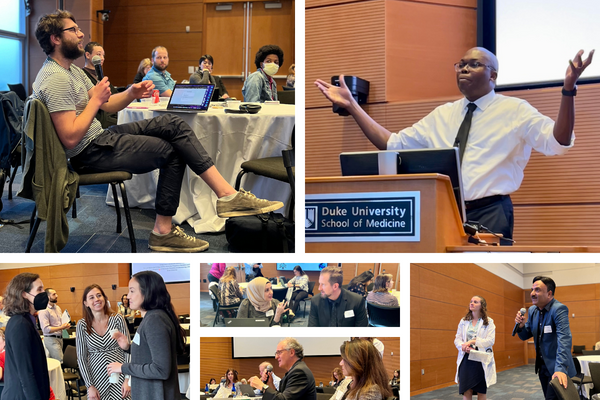Genomics Research Shines at Scientific Retreat

The Precision Genomics Collaboratory held its second annual Genomics Scientific Retreat on February 23 in the Trent Semans Center Great Hall. The event showcased two keynote speakers; 12 oral and over 30 poster presentations from undergraduate and graduate students, postdoctoral and other fellows, research staff, and early-stage investigators; and a rapid fire innovation session and panel discussion from established investigators.
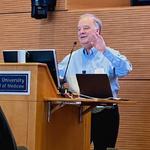 Rick Myers, PhD, chief scientific officer and president emeritus of the HudsonAlpha Institute, was the first keynote speaker. His research focuses on the human genome and how changes in gene expression contribute to human health, disease, and basic biological processes. His lab is applying functional genomics tools to understand basic mechanisms, developing and applying technologies to identify biomarkers for disease diagnosis and treatments, and identifying new gene candidates and risk factors for diseases of the nervous system.
Rick Myers, PhD, chief scientific officer and president emeritus of the HudsonAlpha Institute, was the first keynote speaker. His research focuses on the human genome and how changes in gene expression contribute to human health, disease, and basic biological processes. His lab is applying functional genomics tools to understand basic mechanisms, developing and applying technologies to identify biomarkers for disease diagnosis and treatments, and identifying new gene candidates and risk factors for diseases of the nervous system.
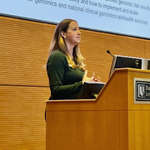 Amy Sturm, MS, CGC, director of population health genomics at 23andMe, shared her journey towards scaling preventative genomics for all. Her path from Ohio State University Medical Center to Geisinger and now 23andMe has given her a vast array of knowledge and experience as a genetic counselor. She advocates for applying preventative and populations genomics through services like automated family history risk assessment tools, novel genetic counseling service delivery models, population genomic screening, and consumer genomics products as ways for people to better understand their genomes, disease risks, and overall health.
Amy Sturm, MS, CGC, director of population health genomics at 23andMe, shared her journey towards scaling preventative genomics for all. Her path from Ohio State University Medical Center to Geisinger and now 23andMe has given her a vast array of knowledge and experience as a genetic counselor. She advocates for applying preventative and populations genomics through services like automated family history risk assessment tools, novel genetic counseling service delivery models, population genomic screening, and consumer genomics products as ways for people to better understand their genomes, disease risks, and overall health.
Five established investigators, Allison Ashley-Koch, PhD, professor of medicine; Raluca Gordân, PhD, associate professor in biostatistic and bioinformatics; Craig Lowe, PhD, assistant professor of molecular genetics and microbiology; David MacAlpine, PhD, professor of pharmacology and cancer biology; and Opeyemi Olabisi, MD, PhD, assistant professor of medicine, from Duke presented short overviews of the innovative work they are conducting in their labs. They then sat for a panel discussion and Q&A.
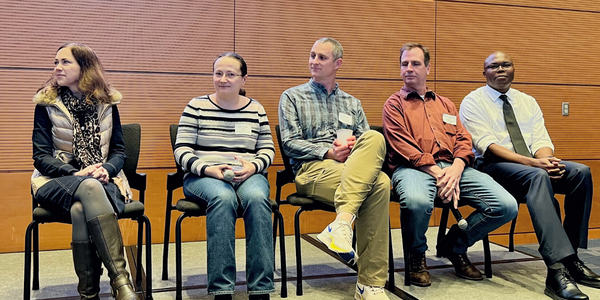
Among the 12 oral presentations from undergraduate and graduate students, postdoctoral and other fellows, research staff, and early-stage investigators, the top four received awards:
- Raven Luo | Graduate Student, University Program in Genetics & Genomics, Cell & Molecular Biology
Investigating the role of insertions in the human genome - Minu Bidzimou | Medical Student, Medical Scientist Training Program, Cell & Molecular Biology
Determining the role of ATP1A3-D801N in short QT mediated sudden cardiac arrest - Rebecca Spillmann |Clinical Research Genetic Counselor, Department of Pediatrics
Diagnoses made following non-diagnostic NGS testing: One UDN Clinical Site’s Experience - Chris Bassil |MD/PhD student, Department of Pharmacology & Cancer Biology
MCB-613, KEAP1, and the ISR: Multiomics approaches identify a collateral sensitivity to drug resistance in EGFR-mutant non-small cell lung cancer
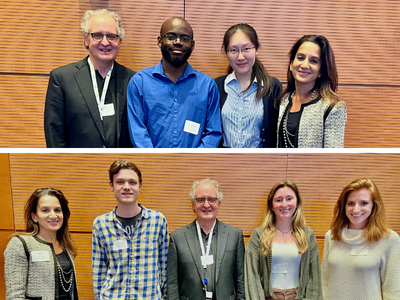
Bottom: Poster winners Justin Savage, Rachel Keener, and Robin Perelli with Shah and Marchuk
The top 3 poster presenters also received awards:
- Justin Savage | Graduate Student, Department of Cell Biology, Department of Neurobiology
How does neuronal contact induce astrocyte transcriptional maturation? - Rachel Keener | Graduate Student, Cell & Molecular Biology
Natural human genetic variation reveals putative receptors regulating Yersinia pestis infection - Robin Perelli | Graduate Student, Cell & Molecular Biology
TAX1BP3 loss-of-function is an autosomal recessive cause of arrhythmogenic cardiomyopathy and TRPV4-mediated arrhythmogenesis
